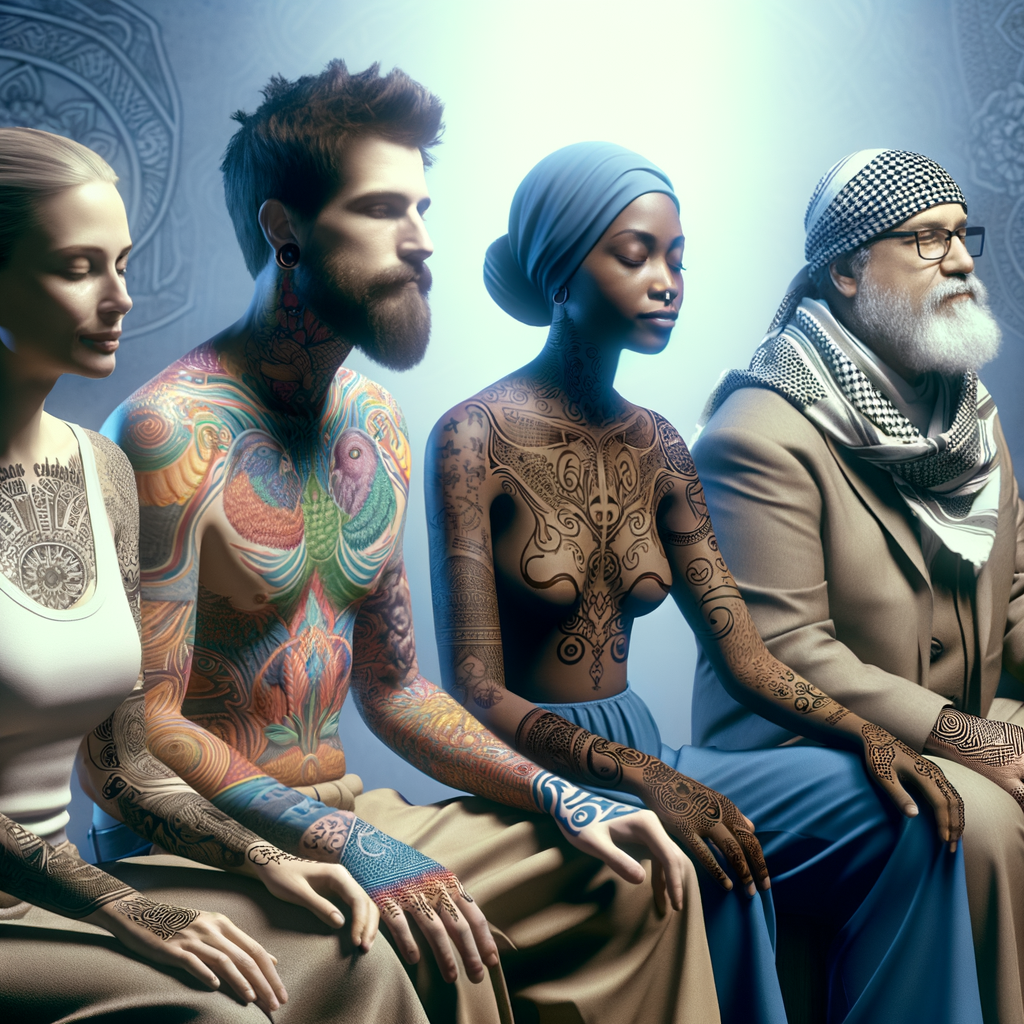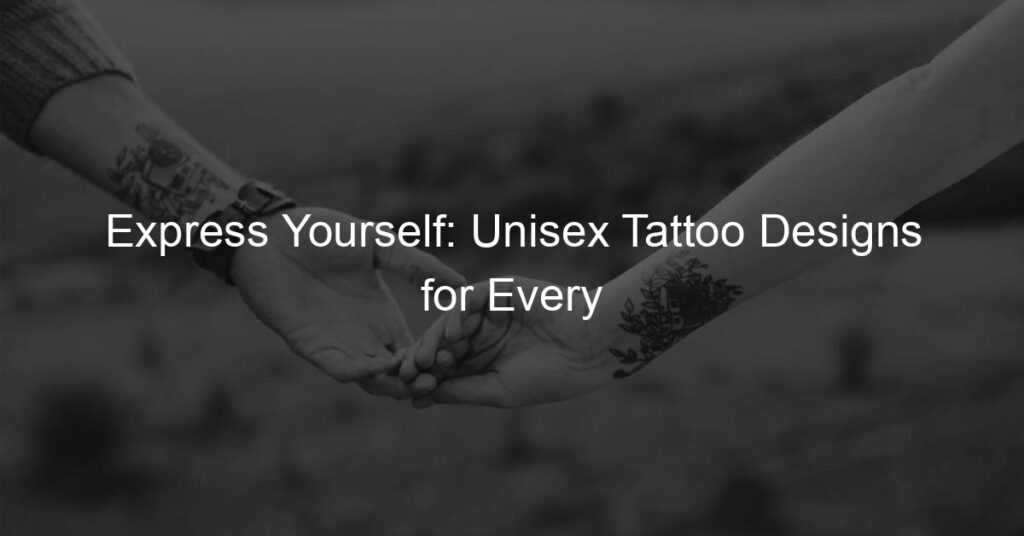
Introduction: Unveiling the Truth about Tattoos
Welcome to our comprehensive guide about tattoos. This article aims to shed light on the truth behind tattoos, debunking common misconceptions and providing you with accurate information.
-
- Understanding the purpose of the article
Our purpose in writing this article is to provide you with a clear and accurate understanding of tattoos. We will debunk common stereotypes, address the question of tattoos being a sin, and delve into the symbolism behind tattoos. By the end of this article, we hope to break the stigma associated with tattoos and provide a balanced perspective.
-
- Highlighting the common misconceptions about tattoos
There are many misconceptions about tattoos that are widely believed. Some people view tattoos as a sign of rebellion or poor decision-making. Others believe that tattoos are associated with certain lifestyles or professions. These stereotypes, however, are not accurate. Tattoos are a form of self-expression and can hold deep personal significance for the people who choose to get them. In the following sections, we will debunk these stereotypes and reveal the truth about tattoos.
In the next sections, we will delve deeper into these topics, providing you with facts, statistics, and real-life examples. We hope that this article will help you understand tattoos better and appreciate them as a form of art and self-expression.
Section 1: Debunking Tattoo Stereotypes
In this section, we will debunk some common myths and stereotypes about tattoos. These misconceptions often lead to misunderstandings and prejudice against individuals who choose to express themselves through body art.
Subsection 1.1: Tattoo Myths
Let’s tackle some of the most prevalent myths about tattoos:
-
- Myth 1: Tattoos are only for rebels and criminals
This is a stereotype that has been perpetuated by movies and television shows. In reality, people from all walks of life get tattoos for a variety of reasons, including self-expression, to commemorate a loved one, or as a form of art. A study conducted in 2018 revealed that nearly 30% of Americans have at least one tattoo, indicating that tattoos are becoming more mainstream.
-
- Myth 2: Tattoos are unhealthy
While it’s true that there are potential health risks associated with tattoos, such as allergic reactions or infections, these risks can be minimized by choosing a reputable tattoo artist who follows proper hygiene practices. Furthermore, the American Academy of Dermatology states that most people who get tattoos experience no complications.
-
- Myth 3: Tattoos are unprofessional
The perception of tattoos in the workplace has significantly changed over the years. Many companies now have a more relaxed dress code, allowing employees to display their tattoos. A 2016 study found that visible tattoos did not impact an individual’s employment, wages, or earnings, debunking the myth that tattoos are unprofessional.
Understanding these myths is the first step towards breaking down the stereotypes associated with tattoos. In the next section, we will discuss some common misconceptions about tattoos.
Subsection 1.2: Tattoo Misconceptions
Let’s now dive into some common misconceptions about tattoos. These are often spread by word of mouth and can lead to unnecessary fear or misunderstanding about the tattooing process and its results.
-
- Misconception 1: Tattoos fade quickly
Many people believe that tattoos fade quickly. This is not entirely true. While it’s accurate that tattoos can fade over time, the rate at which this happens varies greatly. Factors such as the quality of the ink used, the skill of the tattoo artist, and how well you care for your tattoo can all influence how quickly it fades. For instance, tattoos made with high-quality ink by experienced artists and properly cared for can remain vibrant for many years.
-
- Misconception 2: Tattoo removal is easy
Another common misconception is that removing a tattoo is a simple process. In reality, tattoo removal can be a lengthy, painful, and expensive process. It often requires multiple sessions with a laser, which can cause discomfort similar to that of getting the tattoo in the first place. Furthermore, complete removal is not always guaranteed, and there can be scarring or skin discoloration.
-
- Misconception 3: All tattoo artists are the same
The third misconception is that all tattoo artists are the same. This is far from the truth. Just like in any profession, there are varying levels of skill, experience, and artistic talent among tattoo artists. It’s crucial to research and find an artist who not only has a style you like but also maintains high standards of hygiene and professionalism. Remember, a tattoo is a permanent piece of art on your body, so choose your artist wisely.
In conclusion, it’s important to do your research and understand the facts before getting a tattoo. Don’t let misconceptions deter you from expressing yourself through this beautiful form of art.
Section 2: Are Tattoos a Sin?
One of the most common questions people ask about tattoos is whether they are considered a sin. This question often arises from religious beliefs and interpretations. Let’s explore how different religions view tattoos.
Subsection 2.1: Religious Views on Tattoos
Religious views on tattoos vary greatly across different faiths. Here, we will discuss the perspectives of three major religions: Christianity, Islam, and Hinduism.
-
- Christianity and tattoos
Christianity’s views on tattoos are not universally agreed upon. Some Christians refer to Leviticus 19:28 in the Old Testament, which advises against marking one’s body. However, others argue that this rule was specific to the cultural context of the time and does not apply today. Therefore, the acceptance of tattoos varies among Christian communities.
-
- Islam and tattoos
In Islam, tattoos are generally considered haram, or forbidden, due to interpretations of Hadiths (sayings of the Prophet Muhammad). The main reason is that they alter the creation of Allah. However, some Muslims may have different interpretations and choose to get tattoos.
-
- Hinduism and tattoos
In Hinduism, there is no explicit prohibition against tattoos. In fact, tattoos have been a part of Hindu culture for centuries, often used to depict deities or spiritual symbols. However, the intention and the content of the tattoo are important considerations.
In conclusion, the question of whether tattoos are a sin is largely dependent on one’s personal beliefs and interpretation of religious texts. It’s always a good idea to research and reflect on your own before making a decision.
Subsection 2.2: Tattoos and Spirituality
While some view tattoos as a form of rebellion or a fashion statement, many people use tattoos as a means of spiritual expression. Let’s explore the spiritual significance of tattoos and how they can be a form of spiritual expression.
- The spiritual significance of tattoos
Tattoos have been used for centuries as a form of spiritual expression. In many cultures, tattoos are believed to provide protection, symbolize a person’s spiritual journey, or serve as a physical manifestation of their faith.
For example, in Polynesian cultures, tattoos are seen as a rite of passage and a way to connect with the spiritual world. The Maori people of New Zealand use tattoos, or ‘moko’, as a way to show their lineage, status, and spiritual connection.
Similarly, in Buddhism, tattoos of Buddha or other religious symbols are seen as a way to bring about spiritual awakening and protection. In Christianity, many people choose to get tattoos of crosses, angels, or biblical verses as a way to express their faith and devotion.
- How tattoos can be a form of spiritual expression
Tattoos can serve as a form of spiritual expression in several ways. Firstly, the act of getting a tattoo can be a spiritual experience in itself. The pain endured during the tattooing process can be seen as a form of sacrifice or a test of faith.
Secondly, the choice of tattoo design can reflect a person’s spiritual beliefs or journey. For example, a person might choose a tattoo of a lotus flower to symbolize spiritual awakening, or a tattoo of a phoenix to symbolize rebirth and transformation.
Lastly, tattoos can serve as a daily reminder of a person’s spiritual values or goals. Every time they see their tattoo, they are reminded of their faith, their spiritual journey, or the spiritual values they strive to uphold.
In conclusion, while tattoos can be seen as controversial in some religious contexts, they can also serve as a powerful form of spiritual expression. Whether it’s through the symbolism of the tattoo design, the process of getting the tattoo, or the daily reminder it provides, tattoos can hold deep spiritual significance for many people.
Section 3: Understanding Tattoo Symbolism
As we delve deeper into the world of tattoos, it’s important to understand that they are not just about aesthetics. Tattoos carry a rich symbolism that varies from culture to culture. Let’s explore some of these cultural beliefs about tattoos.
Subsection 3.1: Cultural Beliefs about Tattoos
Across the globe, different cultures have unique beliefs and traditions associated with tattoos. We’ll look at three such cultures: Polynesian, Japanese, and Native American.
-
Tattoos in Polynesian Culture
In Polynesian culture, tattoos, or ‘tatau’, hold a significant place. They are seen as a symbol of courage, social status, and spiritual protection. Each tattoo is unique and tells a story about the person’s lineage, skills, and social standing. The process of getting a tattoo is considered a sacred ritual.
-
Tattoos in Japanese Culture
Japanese tattoos, known as ‘Irezumi’, are rich in symbolism and often depict elements from nature, mythology, and Buddhist beliefs. They can represent strength, wisdom, and protection. However, they have a complex history and have been associated with the Yakuza, the Japanese mafia, leading to some societal stigma.
-
Tattoos in Native American Culture
For Native American tribes, tattoos were more than just body art. They served as amulets, status symbols, and marks of punishment or honor. The symbols used often had spiritual significance and were believed to provide protection or power.
Understanding the cultural beliefs about tattoos helps us appreciate the depth and diversity of this art form. It’s not just about the design, but the story it tells and the meaning it holds for the person wearing it.
Subsection 3.2: Tattoos in Religion
Religion and tattoos have a complex relationship, with different faiths having varied views on the subject. In this section, we will explore the use of religious symbols in tattoos and the controversies surrounding them.
- Religious symbols in tattoos
Religious symbols have been a popular choice for tattoos for many years. They serve as a way for individuals to express their faith and spirituality. For instance, Christians might choose to have a cross or an image of Jesus tattooed on their body. Similarly, Buddhists might opt for a tattoo of the Buddha or a lotus flower, a symbol of enlightenment.
It’s not just about the symbols themselves, but also about what they represent. These tattoos often carry deep personal meanings for the wearer, serving as a constant reminder of their faith and beliefs.
- The controversy of religious tattoos
Despite their popularity, religious tattoos are not without controversy. Some religions, such as Islam and Judaism, traditionally prohibit tattoos, considering them a form of body modification that goes against their teachings. This has led to debates about whether it’s appropriate to use religious symbols in this way.
There are also concerns about the potential for misinterpretation or misuse of religious symbols. For example, a non-Buddhist getting a Buddha tattoo might be seen as disrespectful by some Buddhists. Similarly, a Christian tattoo on a non-Christian might be viewed as inappropriate.
Despite these controversies, many people continue to choose religious tattoos as a way to express their faith. It’s a personal decision that often involves careful consideration and respect for the symbol’s cultural and religious significance.
In conclusion, tattoos in religion are a complex issue, with many layers of meaning and controversy. They can be a powerful way to express one’s faith, but they also require a deep understanding and respect for the religious symbols being used.
Conclusion: Breaking the Tattoo Stigma
As we wrap up our exploration of tattoos, it’s crucial to acknowledge the significant strides society has made in accepting and appreciating this form of self-expression. Let’s take a closer look at how society’s views on tattoos have evolved and what the future holds for tattoos in society.
-
- How society’s views on tattoos have evolved
In the past, tattoos were often associated with rebellion, criminality, and deviance. However, over time, this perception has drastically changed. Today, tattoos are seen as a form of art, a personal statement, and even a fashion trend. The Pew Research Center found that nearly 40% of millennials have at least one tattoo, indicating a significant shift in societal acceptance.
-
- The future of tattoos in society
Looking ahead, the future of tattoos in society seems promising. As more people embrace tattoos, we can expect to see an even greater acceptance and appreciation for this art form. Tattoos are no longer just for the rebellious or the outliers; they are for anyone who wants to express themselves in a unique and personal way. As the famous tattoo artist, Kat Von D, once said, “Tattoos are a way of showing the world your true colors.”
In conclusion, the stigma surrounding tattoos is slowly but surely being broken. As society continues to evolve, so too does our understanding and acceptance of different forms of self-expression. Tattoos, once viewed with suspicion, are now celebrated as a vibrant and meaningful form of personal expression. Let’s continue to break down barriers and celebrate individuality in all its forms.






